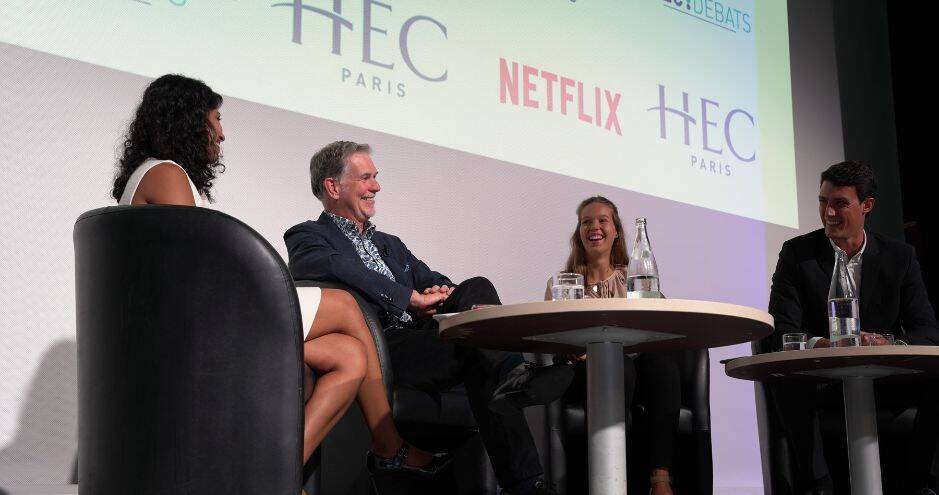Netflix CEO Reed Hastings shares business lessons at HEC Paris
Reed Hastings, the visionary behind Netflix, shared his leadership insights at HEC Paris, emphasize humility, adaptability, and continuous learning. From teaching in Swaziland to revolutionizing TV, Hastings' journey embodies the spirit of innovation and perseverance in entrepreneurship.

He is the man who “revolutionized how the world consumes content,” according to Forbes. Netflix, his thunderously successful TV and movie streaming service, got its start in 1997, when Reed Hastings had a $40 late fee at his local video store and realized there had to be a better business model for DVD rentals.
Twenty-two years later, the CEO and cofounder of Netflix heads a company that reported revenue of $5.24 billion in its Q3 2019 financials. It boasts 158 million viewers worldwide who eagerly await the next original Scorsese release or Tan France lifestyle transformation. Hastings is also a philanthropist, having signed the Giving Pledge and, in 2016, creating a $100 million fund aimed at education reform.
A recent speaker at the HEC Paris MBA’s student-led Global Leaders Series, Hastings shared some of the insights he’s gained during his remarkable career trajectory from Peace Corps volunteer to leader of one of the world’s most well-known companies. A few things he’s learned along the way:
On finding your path
Hastings’ first job after college was teaching high school math in Swaziland. Despite it being rural and isolated, he deeply appreciated the work and his students. He also took that opportunity to hitchhike across Africa. “The experience gave me confidence that I could figure things out,” he says. “My advice to students is to follow whatever excites you. That might be working hard at business; it might be working in Swaziland or moving to Spain or the United States.”
He continues: “Constantly learn and push yourselves. If you’re in a workplace where you are not impressed by most of the other people, find another office. If most of the people around you are really impressive, that’s the environment where you’ll grow the most.”
There’s no magic formula for success
Not all of Hastings’ startup endeavors have ended up household names. One of his million-dollar ideas was a replacement for the traditional computer mouse. Realizing how inefficient it is to “mouse” when typing, Hastings created a business plan and made a prototype for a revolutionary new device: the foot mouse. “It turns out the floor is very dirty,” he explains. “We pulled out all kinds of gross things from it. Plus, you get huge cramps from trying to operate a mouse with your foot.”
Based on his personal experiences, Hastings doesn’t believe in a magic formula for entrepreneurial success. Still, he says that even if your startup eventually fails, what you learn will be invaluable.
Leadership encompasses many qualities
Back when he was coding for a living, Hastings happily pulled lots of java-fueled all nighters. Arriving one morning at the office at 5 a.m., he found the CEO of the company washing his coffee cups dirty from the night before. The explanation? The CEO said to Hastings, “You do so much for this company. Cleaning your cups is one thing that I can do for you.”
“To be a great leader, you have to be humble, and you have to be smart,” Reed Hastings says. “You need both sides.”
“That kind of personal humility, of not looking for any recognition, is something that I’ve always remembered,” Hastings explains. “At that very moment, I felt like I would follow this man to the end of the earth. Unfortunately for us, he did lead that company to the end of the earth. To be a great leader, you have to be humble, and you have to be smart. You need both sides.”
Become less efficient every day
In the 1990s, Hastings co-founded Pure Software, a mightily successful maker of debugging programs. Even though the company was acquired and eventually became part of IBM, Hastings says bureaucracy stifled the business. “Every time something went wrong,” he explains, “I would put a process in place to keep that particular thing from happening again. I thought, ‘This way, we’ll get better and better. By having more procedures, we’ll have less errors.
“In the short term, that’s actually effective. But in the long term, it makes the company more rigid and less flexible, because the people that you attract to that company will be the type of people who want to follow procedures. And when the market shifts – and every market eventually shifts – you will be optimized only for one market. You need to have enough of the people who are inventive, crazy and thinking outside the box.”
At Netflix, he says they’ve made an effort to be a little less efficient every day, effectively choosing long-term flexibility over short-term efficiency. The company is also known for its innovative management practices such as unlimited sick and vacation leave.